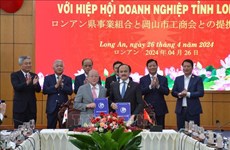VN calls for more investment for housing development
Vietnam encourages more private
investment in housing development with a view to attaining the target
of raising the average dwelling area per capita to 14.3 sq.m by 2010
and 18 sq.m in 2020.
Vietnam encourages more private
investment in housing development with a view to attaining the target
of raising the average dwelling area per capita to 14.3 sq.m by 2010
and 18 sq.m in 2020, according to the Ministry of Construction.
Speaking at a seminar on August 5 in Hanoi , Nguyen Manh Ha, Director of the ministry’s Department for Housing and Real Estate Market Management, said that at present, the total housing stock of the country exceeds 1 billion sq.m, which means every Vietnamese has 12.2 sq.m of housing on average.
Of the total, around 30 percent, or 320 million sq.m of dwellings are built in urban areas and the remaining 70 percent in rural areas, Ha added.
Almost all participants at the seminar, entitled “Creating incentive policies for housing development”, agreed that Vietnam ’s housing policy has been modified to better cater the people’s growing needs during the fast-paced process of urbanisation in recent years.
The Vietnamese Government decided to eliminate its housing subsidy system in 1986, shifting toward more market-oriented mechanisms, such as selling state-owned houses to tenants, investing in new urban areas with multi-storey housing blocks and mobilising people’s ability to get more involved in their own housing.
However, Ha pointed out that up to 70 percent of the total housing stock was built by individuals (either new construction or renovation) while investors’ contribution was only 30 percent.
Meanwhile, a survey by the UN Habitat – an urban development programme in Vietnam --suggested that 25 percent of the current dwellings in Vietnam are of poor quality, with some of them being makeshift houses built by low income families that can’t afford to buy a new house or renovate their current dwelling.
Therefore, the Ministry of Construction said priority will be given to the implementation of the national housing development programme for the 2010-2015 period, which will further create favourable conditions for investors, both local and foreign, to develop housing in the country.
The programme will focus on renovation and reconstruction of old housing blocks, and development of flats for low-income people, students and workers./.
Speaking at a seminar on August 5 in Hanoi , Nguyen Manh Ha, Director of the ministry’s Department for Housing and Real Estate Market Management, said that at present, the total housing stock of the country exceeds 1 billion sq.m, which means every Vietnamese has 12.2 sq.m of housing on average.
Of the total, around 30 percent, or 320 million sq.m of dwellings are built in urban areas and the remaining 70 percent in rural areas, Ha added.
Almost all participants at the seminar, entitled “Creating incentive policies for housing development”, agreed that Vietnam ’s housing policy has been modified to better cater the people’s growing needs during the fast-paced process of urbanisation in recent years.
The Vietnamese Government decided to eliminate its housing subsidy system in 1986, shifting toward more market-oriented mechanisms, such as selling state-owned houses to tenants, investing in new urban areas with multi-storey housing blocks and mobilising people’s ability to get more involved in their own housing.
However, Ha pointed out that up to 70 percent of the total housing stock was built by individuals (either new construction or renovation) while investors’ contribution was only 30 percent.
Meanwhile, a survey by the UN Habitat – an urban development programme in Vietnam --suggested that 25 percent of the current dwellings in Vietnam are of poor quality, with some of them being makeshift houses built by low income families that can’t afford to buy a new house or renovate their current dwelling.
Therefore, the Ministry of Construction said priority will be given to the implementation of the national housing development programme for the 2010-2015 period, which will further create favourable conditions for investors, both local and foreign, to develop housing in the country.
The programme will focus on renovation and reconstruction of old housing blocks, and development of flats for low-income people, students and workers./.













